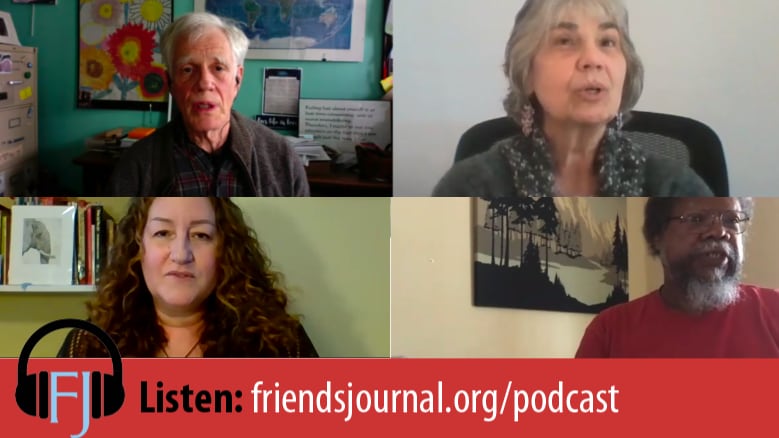
Ten years ago I was struggling with a feeling of not belonging. The feeling started during a plenary session at the Friends General Conference Gathering. The presenter started her speech by noting that profit-making businesses were really efficient at getting things done. She told a story about how Walmart acts as a first responder in cases of hurricanes. Walmart is able to get the supplies needed after a storm—things like bottled water, plywood, and batteries—to those who need them much faster than nonprofits can. My head was nodding. I have worked in profit-making businesses my entire life, and I know how they can be well-oiled machines.
But then she went on to detail various problems with for-profit corporations. In one example, she highlighted the large marketing budget of a company where I used to work. I started to feel attacked. This feeling intensified during the rest of the Gathering whenever I introduced myself to others. As soon as I mentioned what kind of work I did, the people I’d just met dumped all their complaints about the industry I had worked in for over a decade.
I came home from the Gathering feeling battered. I wondered whether I could continue to be both a Quaker and in my career. Quakerism was relatively new for me. I had been raised in another faith tradition and had been seeking a more comfortable spiritual home for many years. In Quaker meeting, I was regularly experiencing God in silent worship and felt that my spiritual life was blossoming. But now it seemed that, while the Religious Society of Friends fit me spiritually, it wasn’t going to work with the rest of life. My spiritual home didn’t feel like a home anymore. I was in a spiritual crisis.
I’ve deliberately delayed revealing that my career was in pharmaceutical marketing. Yes, I worked in one of those industries and one of those fields that some call evil. The very budget the speaker had identified as a problem included my salary and the projects I had created.
I agonized over this issue. Even though I wasn’t yet a member, the meeting I had been attending (Rahway–Plainfield Meeting in Plainfield, N.J.) assigned me a clearness committee. My committee helped me identify three areas of exploration to consider in my discernment. The first was to explore more deeply one of the questions I had been hearing, whether I could apply my skills in a different area (one that wasn’t open to such criticism by Quakers), such as working for a nonprofit. The second was about whether I had any uneasiness of my own about the pharmaceutical industry. And the third was to explore the rich history of Quakers in business.
Over time I got answers. I discovered that my talents weren’t sought after in the nonprofit arena, nor did I have a passion for the types of work available in nonprofits. I came to see that I was passionate about my work and that it was a calling for me. I was doing important work to uncover what doctors and patients needed in a new medication and to make sure the company heard about those needs. This is a for-profit version of “giving voice to the voiceless.” On reflection about the drug industry, I came to believe that pharmaceutical companies fill a necessary role in society in an imperfect way because they are a human-created institution. Despite the problems, I was proud to be part of helping to improve (and save) people’s lives—a small part but still a part.
Finally, delving into the history of Quakers and business led me to my final conclusion. Years earlier, I had had questions of how to apply my faith to my business life. I hadn’t found any answers in the Baptist tradition I had been raised in, but in Quakerism, there was a history of people who had asked the same questions. I was able to find my own answers in Quakers’ rich history of running their businesses according to their faith. I realized there needed to be an intersection of Quakers and business people, and that was my place, no matter how uncomfortable it was. Contrary to what I initially thought, I would be able to integrate both parts of my life finally—a true version of integrity.
I’ve since left that job to go back to school at Earlham School of Religion to study the history of Quakers in business and am involved with a new organization for those Quakers who are involved with or interested in business. But my paying work will continue to be in the for-profit sector. That is where I am called.




“I realized there needed to be an intersection of Quakers and business people, and that was my place, no matter how uncomfortable it was.”
Loved that line, and I so admire you for staying persistent and true to your calling even when it was uncomfortable! Something else I think about- nonprofits would not exist without for profits. My job at a domestic violence shelter requires thousands of products made by for profits – everything from computers to desks and knitting needles. When I attend racial justice conferences we stay at fancy hotels, owned by wealthy corporations.
I couldn’t do what you do, but I honestly admire your search and your openness to the answers. Quakers do seek to align their faith with their everyday lives, perhaps differently than other faiths (perhaps not, I’m no expert). If you believe your work helps “the voiceless” as opposed to, say, being part of the medical-industrial complex, then follow that leading. You need not be accountable to anyone, especially Friends, except yourself and your sense of Spirit.
Blessings on your journey. Market the drugs as long as thou canst.
Thank you Karen for so clearly explaining why more Friends need to be IN business or least need to be supporting those of us who are IN business. We are those brave Friends who go where Quakers fear to tread. The R S of Friends sure talks about finding that of God in Everyone. But when it comes to businesspeople. … look out! This has to do, in my opinion, with avoidance of some very hard facts that are mentioned by Solani. As for the “medical industrial complex”.. .
Am I the only one here whose life was saved by drugs? I was diagnosed with Stage 4 Lymphoma in early 2002 and told that I had only a 20% chance of survival. Luckily, my oncologist gave me a relatively new drug (in American, anyway) called Ritusen. After reading up on that drug, I believe that made the biggest difference.
Sure, I also have side-affects from the chemo 14 years later. Neuropathy in my feet and fingers. A blood clot that nobody warned me to is a high probability event for someone undergoing chemotherapy. And depression, which also seems to be brought on by some of the many chemicals that were introduced to my body. Yet, I am alive and happier for it! 🙂
As you can see from my LinkedIn page, I, have had a leading to work with many businesses. What i did was to help people to communicate better among themselves and with their “community”. That included just about everyone: vendors, customers, governments, employees, retirees, stockholders/owners. I also have helped not for profit business. I practiced our testimonies at work and lost lots of deals for it. I even lost my company to my partners, who were NOT Friends, when the 2009 recession hit. Yet, I loved every minute of it. I was able to help many people have a better work experience because I could see that of God in them and they returned the favor. Business rely a lot on trust and our emphasis on integrity is what is mostly needed for the “internal wars” that happen in businesses (of all sorts) to lay down their weapons.
In my experience, not for profits are simply businesses that are allowed to raise money tax free! They do everything that a for profit business does except their “customers” don’t usually pay them. It is the “public” who are led to support the work of that nfp business who provides the funds that keep the doors open and the lights on. I could tell you stories.. .. but I won’t. Take it from me, not for profits exploit their workers and are not so good at solving the problems that society pays them to fix.
Thank you Karen for following your leading and for sharing it with Friends.